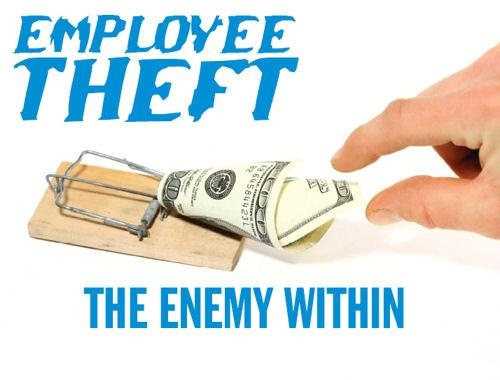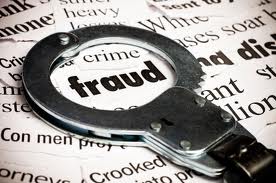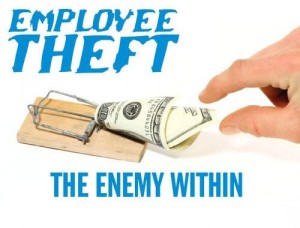by Syed Faiez Hussain
Knowing Background of an Employee can help protect your company against Employee Theft.
Crime is the LOUDEST word that we have heard in past decade. Inflation in business crime has increased like never before. Open up your daily newspaper on just about any given day and there’s a very good chance you will see an article about one or more employees caught stealing in some form from their place of employment. The U.S. Department of Commerce estimates employee theft to be $40 BILLION annually. Some portrayed stories are underlined as references to let you know, how employee theft is hurting our businesses;

“A New York newspaper has reported that a woman who allegedly claimed her ailing boyfriend as her husband in order for him to receive medical treatments (it cost her employer over $100,000 in out-of-pocket costs)”.
“Another newspaper revealed that two employees at a retail establishment who supposedly stole and sold store merchandise for profit on eBay. Thus far but still counting, stolen merchandise is already valued at over $50,000”.
And the most daunting story is still to come, when a business owner attempted to teach a fraudulent worker a lesson; he ended up learning a few things himself.
“A business owner in England found out one of his trusted employees wrote a company check to himself for £845 ($1,375.66 US) and then cashed it.
Enraged, the owner decided to practice a bit of street justice. So he placed a sign — which read “Thief. I stole £845. Am On My Way to Police Station” — around the thieving staffers’ neck and marched him through town before eventually handing him over to the police.
But the police let the thief off with just a warning, and then he sued his boss for humiliation, false imprisonment and lost wages. In the end, the business owner was forced to settle the lawsuit for £13,000 ($21,164)”.
Employee Theft is the Biggest Problem for All Sort of Businesses:
From corporate giants to small-medium businesses, all are affected by this crime. In the current scenario when the world has already seen a biggest halt in economy interims of recession, there is darn need to stop and prevent employee theft.
Although it can be tough to pin point the problem, some telltale signs of thieving employees may include; unusual behavior, such as defensiveness, irritability and suspiciousness, missing documents, frequently used names and addresses for refunds, unbalanced ledgers, inventory shortages, and merchandise frequently shipped to P.O. Box numbers.
But the point is that, why a company would let anyone enter their peaceful crime free environment? They never want that, because it can not only damage their reputation but it can also give them a financial loss over hiring and then to employee theft, fraud and embezzlement.
So the first and foremost line of defense against employee theft, fraud and embezzlement is to adopt strict pre employment criminal background checks and credit history background checks before hiring anyone into the organization.
8 Best Ways to prevent Employee Theft, Fraud and Embezzlement:
- Pre employment Criminal background checks: The first step to preventing employee theft is to screen job applicants thoroughly before hiring them in the first place. Background checks should be performed and should include a check on criminal history, civil history, driver license violations, as well as verification of education, past employment (including reasons for leaving), and references.
- Credit History Background Checks: Consider running a credit check on prospective employees, as people with financial difficulties are more prone to fraud. In order to do this, you are legally required to notify the job applicant in writing that a credit report may be requested. You also need to receive the applicant’s written consent.
- Be clear with employees: that your company has zero tolerance for employee theft of any sort. This includes not only outright stealing, but also things such as taking a long lunch break without approval, using sick leave when not sick, doing slow or sloppy work, or coming to work late or leaving early.
- Mention Company Policy: Write and distribute a company policy that outlines exactly what constitutes stealing. Contact your local police department if you do discover an incident of employee theft so you send a message to your employees that stealing will not be tolerated.
- Be a Role Model for Your Employees: Business owners and senior management must themselves be role models of honesty and integrity, or they may risk setting up a work environment that justifies illegal and criminal activity.
- Separation of duties is critical: Avoid at all costs allowing the finances of a business to be handled and controlled by a single individual. No employee should be responsible for both recording and processing a transaction.
- Run surprise audits and criminal activity background checks: Third party investigations are essential once a year. Also insist that your bookkeeper or any employee who has access to monies take a yearly vacation so you can examine their records.
- Customer Complaints can also identify: Personally look into customer complaints that they have not received credit for payments.
Conclusion:
We like to think the best people with whom we work or who work for us. However, it can be costly to naïve about employee theft and fraud. As the insider threat entry noted, your employees are a source of risk. They have the access to and knowledge about your organization to steal variety of organizational assets, including equipment and money, or to commit fraud.
Those employers are wise who initiate their hiring process by proper pre employment criminal background checks on their job candidates. And this first on process is making difficult for criminal employees to enter a safe secure peaceful environment of any organization, because every criminal possess a past and they can be pointed out during their pre employment criminal background checks.

 Follow
Follow






